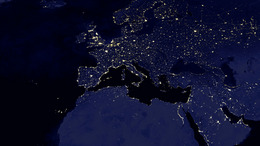This is a great challenge in view of a mixed record of 25 years of Euro-Mediterranean cooperation and ten years of Arab uprisings. The immense socio-economic problems resulting from the Corona pandemic also increase the pressure to act.
![[Translate to English:] Karte des Mittelmeers mit Anrainerstaaten](/fileadmin/files/_processed_/5/1/csm_800352798panthermedia_B240537112_ST_EZ_bear_10afb95a95.jpg)
© PantherMedia / ii-graphics
The European Neighbourhood Policy 2021: New impulses for the south
The European Union wants to make its neighbourhood policy in the southern Mediterranean more dynamic from 2021. ” A democratic, more stable, greener and more prosperous Southern Neighbourhood” is the goal, as noted in the conclusions of the EU Council of December 11, 2020. The EU-27 is (re)setting this high standard for its actions and activities.
Content
Democracy, stability and prosperity
Already 25 years ago, at the end of November 1995, when the Euro-Mediterranean Partnership was founded in Barcelona, all governments agreed on ambitious guiding goals. Nothing less than democracy, peace and shared prosperity should shape the future reality in Morocco, Algeria, Tunisia, Libya, Egypt, Jordan, Israel, the Palestinian territories, Lebanon and Syria. The only progress made was on the economic front – mostly to the advantage of the rulers and their clientele.
People embraced these guiding goals with their slogans “freedom, work and dignity” during the Arab uprisings (“Arabellion,” “Arab Spring”) and heatedly demanded them from their leaders. This triggered turbulent upheavals 10 years ago – revolutions and restorations, reforms and regressions, consensus and wars.

marcovdz, Ben Ali c'est Fini 1 / Flickr - CC BY-NC-ND 2.0, https://creativecommons.org/licenses/by-nc-nd/2.0/
Demonstrants holding Sign saying "Halte à la repression au Maghreb".
Powerful players stand against the EU in the Mediterranean region
Complex problems, conflicting interests and different players are blocking the realization of these guiding goals. Some examples:
Just 25 years ago, the EU, supported by the USA, was the central actor in promoting democracy and market economy in the Mediterranean.
Today, the EU faces military and economic engagement from difficult neighbours: Turkey, Russia, Iran and the United Arab Emirates/Saudi Arabia are pursuing interests that run counter to European democracy promotion – most clearly in geographically important Mediterranean littoral states like Libya, Syria and Egypt.
Ring of war and conflict zones around the EU
Only 25 years ago, the territorial conflicts around Israel-Palestine as well as the Western Sahara were determining, today the war and conflict zones in Libya, Syria and around Cyprus are in the centre of attention for the development of stability and peace. In addition, the new U.S. administration will urge Brussels to take more responsibility in the EU neighbourhood. A plea to the EU-27 for demonstratively more united action.
Just 25 years ago, the prosperity gap between the EU’s Mediterranean neighbours and the southern Arab neighbourhood countries was ten to one. Today, rulers in many Arab countries must achieve much higher and faster growth to create millions of jobs for a young population. This pressure is exacerbated by the consequences of the corona crisis: the weakening economy in the EU reduces export volumes for products and employment opportunities for seasonal workers from the south; money remittances from relatives in Spain, Italy and France are lower; debt and inflation are rising; unemployment and poverty are increasing; state health care systems are weak.
Heterogeneous neighbours beyond the Mediterranean
The heterogeneity of the economies, societies and politics in the ten countries of the southern neighbourhood also complicates a regional Mediterranean cooperation approach to implementing the guiding goals:
War and flight are authoritative in parts of Syria and Libya.
Egypt and Algeria are geopolitically important but politically difficult partners for the EU.
The EU’s relations with Morocco, Jordan, Tunisia and Lebanon are close.
Israel is the most innovative economic power in the region and has many ties with the EU; the Palestinian territories are a special case.
Beacons of hope
In the shadow of these more difficult conditions, hopeful starting points for implementing the guiding goals of democracy, stability, green economy and prosperity have emerged – a few examples:
Tunisia – beacon of democracy: In the North African country, a representative democracy with constitutionally protected freedoms emerged after the 2011 Arab uprisings. Along with Israel, it is the only one of the ten countries in the southern neighbourhood in which this is the case. Nevertheless, the democratic commitment of Tunisians is endangered by a still missing economic dividend.
Civil society engine: Since 2005, the Anna Lindh Foundation has facilitated a trans-Mediterranean network of now more than 4,000 non-governmental organizations (NGOs) that learn from each other through joint projects. The network also strengthens civil society engagement in countries where freedom is restricted by state control.
Start-ups, solar plants, trade agreements
Drivers of innovation: Despite dictatorships or conflict areas, whether under the adversity of bureaucracy or unstable Internet and power supply, many young people take their fate into their own hands. They found NGOs that help the socially needy in the pandemic, for example, or start-ups that give them and their unemployed friends a livelihood.
Morocco is green: Behind Sweden and Denmark, the North African country is among the “top climate champions” of the global 2020 Climate Change Performance Index (CCPI), thanks to its ambitious programme to rely on wind and solar power.
Promoting prosperity: Eight of the ten countries in the southern neighbourhood have an association agreement with the EU, and many of them are closely linked to the European single market through high import and export rates. Integration into this economic area also makes it possible to promote transparency and the rule of law in their own economies by adopting European legal standards. The EU’s southern neighbours can learn from the experiences of deeper integration into the European economic area the EU’s eastern neighbours, such as Moldova, Ukraine and Georgia, have made.
The following initiatives also promise to have an impact on the EU’s planned promotion of democracy, stability and prosperity in the southern neighbourhood:
Promoting democracy through rule of law and the fight against corruption
In order to overcome the immense social, economic and ecological problems, private and public investments are needed in the south as a survey of experts from all southern Mediterranean countries found in 2021. Investments need legal certainty. The promotion of the rule of law through EU projects must also achieve that rich Mediterranean residents invest their assets, parked in western accounts, in their home countries. Investment risks cannot only be shouldered by European taxpayers.
Increasing stability via UN missions and demonstrative EU unity
A peaceful resolution of the numerous wars and conflicts in North Africa and the Middle East requires ownership by the conflict parties and a high level of international legitimacy for mediating institutions. The United Nations is present with mandates and missions from Western Sahara via Libya to Syria. Despite blockades in the UN Security Council, it would be expedient for Europe to strengthen the UN missions. To this end, it is advisable that the EU member states demonstrate this not only in Brussels but also practically on the ground. Example: The “Berlin process”, which is supposed to strengthen conflict resolution and the role of the United Nations in Libya, will be more effective if France and Italy also put aside their conflicting bilateral interests in Libya.
“Green and prosperous” through sustainable agriculture and reforestation
Agriculture is an important employer for the Mediterranean countries. The EU should reduce its export of subsidized agricultural products to them and provide better access to the EU internal market and higher quotas for their products for the southern economies.
A comprehensive reforestation programme around the Mediterranean Sea also acts as a job engine and climate improver. Fresh water for flora, fauna and humans can be obtained from seawater desalination plants. To this end, renewable energies may be further developed. Wastewater treatment plants and sewage treatment plants must be modernized or newly built.
With its guiding goals of promoting democracy, stability and green economy more effectively in its fragmented and complex southern neighbourhood from 2021, the EU-27 is taking on the obligation to act with greater solidarity and confidence in this region as well – but this also means that European decision-makers must stand up to corrupt elites, authoritarian rulers and external warmongers.






